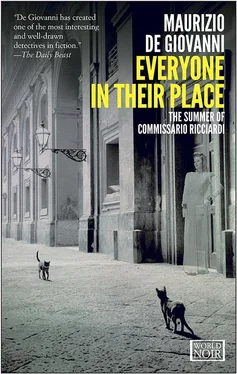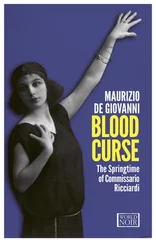Maurizio de Giovanni - Everyone in Their Place
Здесь есть возможность читать онлайн «Maurizio de Giovanni - Everyone in Their Place» весь текст электронной книги совершенно бесплатно (целиком полную версию без сокращений). В некоторых случаях можно слушать аудио, скачать через торрент в формате fb2 и присутствует краткое содержание. Жанр: Исторический детектив, Полицейский детектив, на английском языке. Описание произведения, (предисловие) а так же отзывы посетителей доступны на портале библиотеки ЛибКат.
- Название:Everyone in Their Place
- Автор:
- Жанр:
- Год:неизвестен
- ISBN:нет данных
- Рейтинг книги:4 / 5. Голосов: 1
-
Избранное:Добавить в избранное
- Отзывы:
-
Ваша оценка:
- 80
- 1
- 2
- 3
- 4
- 5
Everyone in Their Place: краткое содержание, описание и аннотация
Предлагаем к чтению аннотацию, описание, краткое содержание или предисловие (зависит от того, что написал сам автор книги «Everyone in Their Place»). Если вы не нашли необходимую информацию о книге — напишите в комментариях, мы постараемся отыскать её.
Everyone in Their Place — читать онлайн бесплатно полную книгу (весь текст) целиком
Ниже представлен текст книги, разбитый по страницам. Система сохранения места последней прочитанной страницы, позволяет с удобством читать онлайн бесплатно книгу «Everyone in Their Place», без необходимости каждый раз заново искать на чём Вы остановились. Поставьте закладку, и сможете в любой момент перейти на страницу, на которой закончили чтение.
Интервал:
Закладка:
The sheer irrationality of the sensation made it impossible for him to examine the problem the way he was accustomed to doing with his work. He kept repeating to himself: if you’ve always known you couldn’t approach Enrica, that you had to protect her from your pain and your absurd nature, how dare you suffer like a dog now, just because you’ve seen her with another man? What sense is there to this suffering of yours?
It makes no sense at all, he answered himself. All the same, the stabbing pain behind his stomach, somewhere beneath his lungs, remained just as intense.
Neither of the two men, as they struggled with their own malaise, had noticed the state of mind of the other; the policemen who had watched them as they left headquarters had, though, and they had exchanged knowing winks: this was no day to tangle with them.
Along the way, Ricciardi once again encountered the man who’d been beaten to death, launching his invective against those who had killed him:
“Buffoonish clowns, you’re nothing but four buffoonish clowns. Four to one, for shame, for shame, you buffoonish clowns.”
The commissario just grew darker and grimmer. He thought to himself: you could have lived a normal life, had a wife and children. You could have eaten and drank, laughed and played. You could have sat on a sofa, at night, whispering sweet words to a girl. And instead, you got yourself beaten to death in exchange for the satisfaction of talking smart to some idiot with a billy club. The usual damned waste.
The palazzo’s front door was half-closed, as was customary when in mourning. On the closed door panel a sign read:
FOR THE DEATH OF THE SIGNORA DUCHESSA
ADRIANA MUSSO DI CAMPARINO.
Sciarra, the doorman, was sweeping in the courtyard, doing his best to stay in the shade where however it was already perfectly clean. With every stroke of the broom, he had to pull up the sleeves of his shirt, which kept slipping down and covering his hands. Near him, the same two children they had encountered on their last visit were eating two enormous pieces of bread and cheese. As soon as the man saw Ricciardi and Maione, he came toward them with that pouncing gait of his.
“Commissario, Brigadier, good day to you. How can I be of service?”
Maione wasted no time on rote courtesy, in part because he was clearly irritated at the sight of the children stuffing themselves hand over fist.
“I only need you to take us in. We’re here to talk with the duke and his son.”
Ricciardi broke in:
“First I want to take a look at the duchess’s room, though. Isn’t the housekeeper here?”
“Of course she is, Commissa’, I’ll call her for you immediately.”
“One more thing, Sciarra. Where were you, the other night, when the murder happened?”
The doorman spread his arms, letting the sleeves trail below.
“Where do you think I was? Upstairs, at home, keeping an eye on these two devils.”
The older of the two spoke, while still noisily chewing his food.
“So unless Papà comes and feeds us, we refuse to go to bed. We only eat when Papà’s there!”
Maione made a face.
“Then Papà must always be there, because every time I see you, you’re eating.”
“What can you do about it, Brigadie’? These two are wolves, they’re not human children. I don’t know where they got it, not from my side. Wait for me here, I’ll go and get Concetta.”
Here they come now. I can see them both clearly, the big bulky brigadier in uniform and the other one, the skinny one: the commissario. I asked Concetta and she told me what they asked her yesterday.
I was amazed: I thought that they’d want to talk to us immediately, me and the old corpse. But instead they just left. Maybe they wanted to let us steam for a while, bubble in our broth. But I didn’t simmer and wilt, even if it’s hellishly hot. I stayed here, good as gold, tending my plants, here on the terrace. Without altering a gesture, without uttering a word I wouldn’t have said normally.
Not because of their suspicions, not because of that. But because I refused to allow yesterday and today to be different days, in any way, shape, or form. Nothing’s happened. Has something happened, after all, when a sewer rat dies down in the filthy alleys, in the vicoli ? Has something happened if a rabid bitch is stoned to death by a band of street urchins? No. Nothing’s happened. Life goes on, the same as before, with everyone in their place. The bigger the picture, the less the details count. And here, really, nothing’s happened at all.
Though, actually, I wouldn’t say that absolutely nothing’s happened. After all, I have the ring back.
Concetta materialized at the top of the stairs in silence; this woman, Maione thought, had the ability to appear and disappear without anyone seeing her. Even as big and tall as she was.
“Gentlemen, a good day to you. I’m at your service.”
Ricciardi looked at her as if he’d just awoken from a nap.
“And a good day to you. We’re here to speak with the duke and his son, but first I’d like to take a look at the duchess’s bedroom. Could you take us to see it?”
“Certainly, Commissario; it’s still just as the duchess left it, as you know she never even got a chance to retire for the night. Come right this way.”
They passed through the anteroom. Ricciardi immediately saw the image of Adriana di Camparino in front of him; staring right at him with her dead eyes she repeated:
“The ring, the ring, you’ve taken the ring, the ring is missing.”
And we’ll see if we can’t find it, he thought to himself.
They followed the Sivo woman as she moved soundlessly, through a long series of rooms. There was a scent of cleanliness and everything was in perfect order, but the general impression was of a place devoid of life. They strode through an endless succession of drawing rooms, each of them wallpapered and upholstered in a different color. They also passed through a chapel, dominated by an altar with a reliquary that seemed quite ancient. Concetta stopped and genuflected, rapidly crossing herself; Maione took off his cap and bowed his head, while Ricciardi paused to take in a wheeled gurney. The housekeeper, following his gaze, said:
“It’s for the duke, when the priest comes to say mass.”
Immediately after that, she ushered them into a large bedroom, at the center of which stood a double canopy bed, draped with mosquito netting. Here the prevailing hue was rose, from the silk wall coverings to the oversized cushions, the upholstery of the sofa, and the two armchairs in one corner. The French doors led out onto a balcony overlooking the piazza.
Paintings and photographs celebrated the duchess’s beauty, portraying her in every pose imaginable: at the wheel of a sports car, in an evening gown, dressed as a bride. The painting that took pride of place on the wall facing the bed depicted her, lovely and half-nude, covered with a sheet that she held over her breasts with one hand. The woman had been well aware of how beautiful she was and had made full use of the fact.
Ricciardi thought about death, about how the woman had appeared before his eyes. When she was alive, as he could see from the pictures in the bedroom, she’d always been keenly aware of her appearance: carefully made-up, her hair done in a permanent, her clothing pressed. In the other picture, available exclusively to him, aside from the bullet hole in her forehead, she had rouge smeared over her face from the cushion, as if on a painter’s palette, her fine silk dress rumpled and creased, one stocking half off. The final violation. Death makes a mess.
The odor that pervaded the room was the same scent that he’d noticed under the smell of cordite in the anteroom: a floral essence, on the heavy side. The choice, thought the commissario, reflected the duchess’s true nature, wealthy but hardly the product of a refined upbringing. When it comes to clothing, you can always ask your girlfriends and the owners of the boutiques for advice, but perfume is far too personal of a choice.
Читать дальшеИнтервал:
Закладка:
Похожие книги на «Everyone in Their Place»
Представляем Вашему вниманию похожие книги на «Everyone in Their Place» списком для выбора. Мы отобрали схожую по названию и смыслу литературу в надежде предоставить читателям больше вариантов отыскать новые, интересные, ещё непрочитанные произведения.
Обсуждение, отзывы о книге «Everyone in Their Place» и просто собственные мнения читателей. Оставьте ваши комментарии, напишите, что Вы думаете о произведении, его смысле или главных героях. Укажите что конкретно понравилось, а что нет, и почему Вы так считаете.












